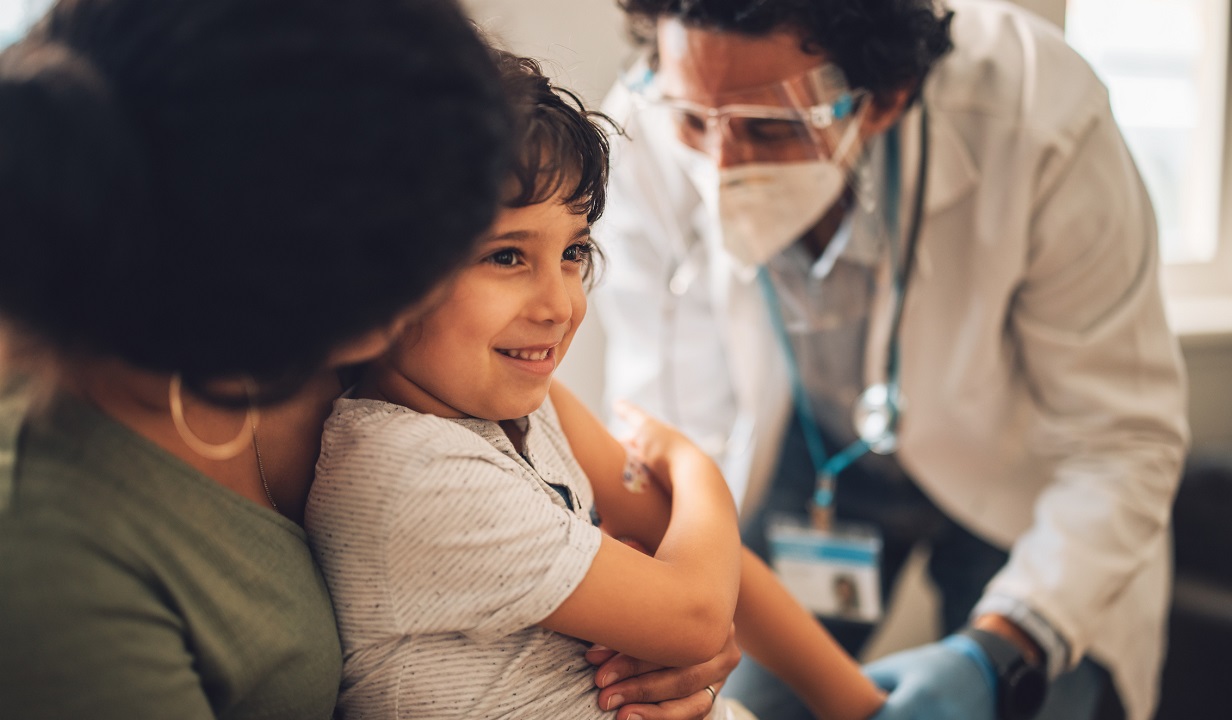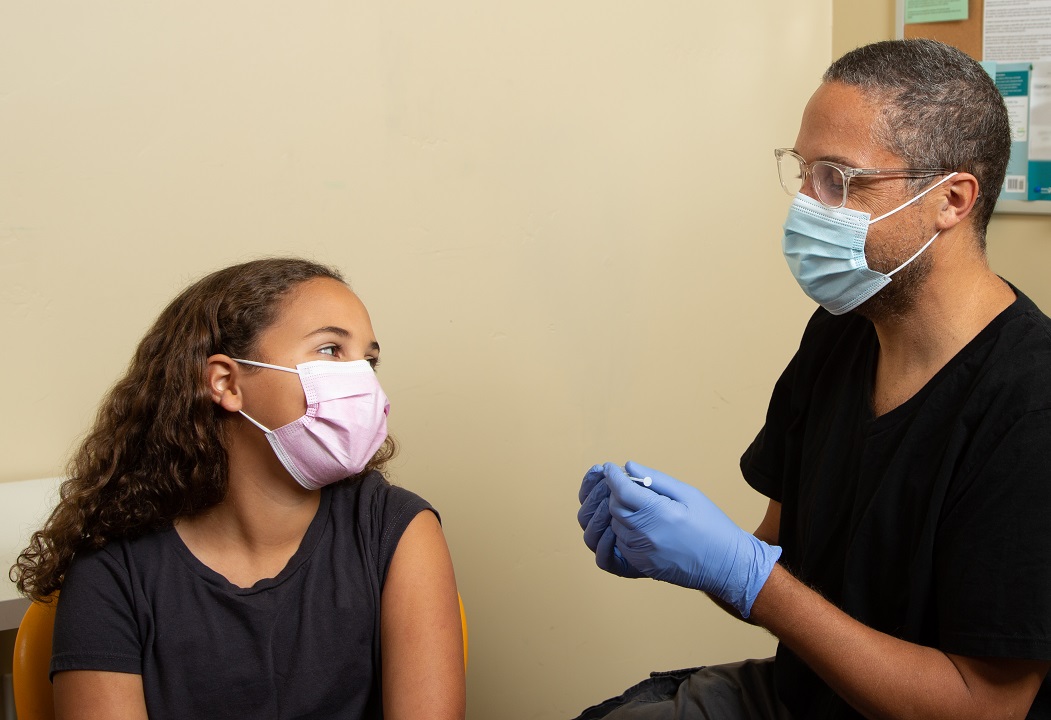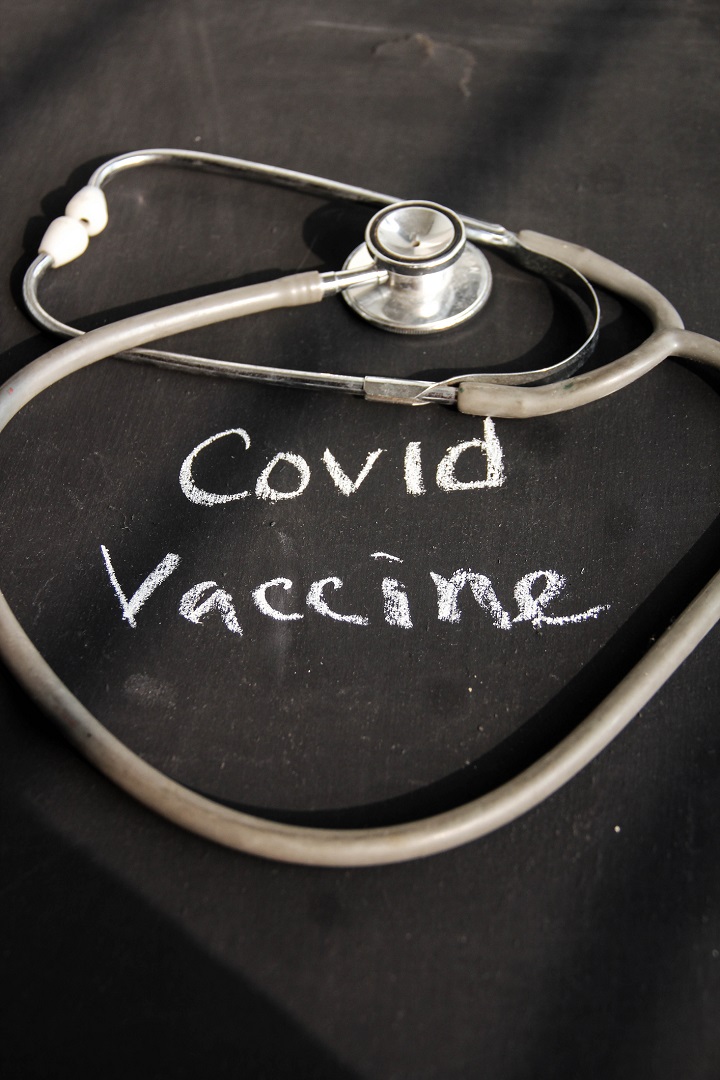Today, Health Canada authorized the use of the Pfizer-BioNTech Comirnaty COVID-19 vaccine in children five to 11 years of age.
Based on Health Canada's review of the safety, efficacy and quality of the vaccine, it determined that the benefits of the vaccine in this age group outweigh the risks.
The National Advisory Committee on Immunization recommends that a complete series with the Pfizer-BioNTech COVID-19 vaccine may be offered to children five to 11 years of age with at least eight weeks between the first and second dose.
Children and youth aged five and older can register to be vaccinated for COVID-19 on the Government of B.C. website or call 1-833-838-2323 (7 a.m. to 7 p.m. daily, translators are available). Parents and guardians who have registered their child
with Get Vaccinated will begin receiving invitations on Monday, Nov. 29, to book appointments.
BC Children's pediatricians have been thoroughly sifting through the research on child and youth COVID-19 vaccination since the pandemic first broke out.
"I've read extensive amounts of data that's been released continuously in the past couple of years about children, COVID-19 and vaccines," says Dr. Manish Sadarangani, a BC Children's Hospital infectious disease physician and director of the Vaccine Evaluation Center.
Dr. Sadarangani says vaccinating your child can be important not only for the health of your child and family, but also for the health of the friends, neighbours and family around you.
"Some children will have severe COVID-19 disease and some children will have complications from it," he says. "Vaccination reduces the risk of infection and therefore the risk of severe disease and complications, but there are also broader impacts of the infection on children.
"Children who have even a mild case of COVID-19 have to be in isolation, which has a big effect on them. Some children have a lot of anxiety around COVID-19 so if they're in an environment where more people are vaccinated, their family and friends are vaccinated, then I think, eventually, it will reduce that level of anxiety and concern for these children."
His reasons are based on the scientific data he's studied and contributed to during the pandemic and the 14 years he's spent evaluating vaccines as an infectious disease physician and pediatrician.
 "The most striking thing is that, thanks to vaccination over the years, we see many fewer children in hospital, due to infections that are now vaccine preventable," Dr. Sadarangani says. "Some of the stories from my more senior colleagues are that the kinds of infections and diseases wards were once full of, including things like bacterial meningitis, 20 or 30 years ago… now if we have a case on the ward, it's a big learning opportunity because they're so uncommon."
"The most striking thing is that, thanks to vaccination over the years, we see many fewer children in hospital, due to infections that are now vaccine preventable," Dr. Sadarangani says. "Some of the stories from my more senior colleagues are that the kinds of infections and diseases wards were once full of, including things like bacterial meningitis, 20 or 30 years ago… now if we have a case on the ward, it's a big learning opportunity because they're so uncommon."
COVID-19 is currently having a greater impact on kids than earlier in the pandemic, because younger children are unvaccinated and many have returned to in-person school and activities. As of mid-November, children aged five to 11 have the highest COVID-19 case incidence rate across all age groups.
"Severe outcomes of COVID-19 are uncommon, but they do occur," says Dr. Sadarangani. "There's some increased risk from some underlying medical conditions, but a lot of children who were otherwise previously healthy have also had severe COVID-19."
Children who have a severe infection (such as a severe chest infection) when they have their COVID-19 infection.
Children who have Multi-system Inflammatory Syndrome (MIS-C), an unusual complication that occurs usually a few weeks following a COVID-19 infection.
"Children can become very sick with this more generalized inflammatory condition, which requires therapy to suppress the immune system," Dr. Sadarangani says. "If you prevent the COVID-19 infection through vaccination, your child is less likely to get severe COVID-19 or the complications from it."
(since March 2020)
- 59 children ages 5 to 11 in hospital tested positive for COVID-19
- 4 of those were in critical care
- 19 confirmed cases of MIS-C (in children & teens)
- 7 of those occurred in children aged 5 to 11
- Unvaccinated youth ages 12 to 17 are 24 times more likely to get COVID-19 than vaccinated youth
Almost 100% of COVID-19 cases in B.C. are the Delta variant and infected children can pass COVID-19 to others around them.

"The highest risk is in the home," says Dr. Sadarangani. "It can be hard to know, in a family with multi-infections, who infected who - but children, in general, are less infectious than adults and most evidence suggests the risk of transmission in a school setting is relatively low."
If a young person is vaccinated, they are much less likely to spread COVID-19.
"If you are vaccinated, you are less likely to get infected in the first place and, therefore, less likely to infect somebody else," he says.
The more people who are vaccinated in B.C., the harder it is for COVID-19 to spread. This helps protect everyone.
Data from clinical trials and studies in children aged five to 11 shows the vaccine is safe and it works. It provides strong protection against infection and very strong protection against hospitalizations. Data from the clinical trials shows the vaccine is about 91 per cent effective for children age five to 11.
Safety data from the trials, which included more than 3,000 children aged five to 11 (half received the vaccine and the other half received a placebo), found the side effects were mostly mild or moderate, and most went away within one or two days. No serious side effects have been detected in the clinical trials for children in this age group.
As with any other vaccine, COVID-19 vaccines for children aged five to 11 go through a rigorous review and approval process in Canada. Large amounts of evidence on safety and efficacy continue to be reviewed and tracked in B.C. and around the world.
COVID-19 vaccination has no impact on future fertility. There is no biological way for this to occur.
Children with previous COVID-19 infection may be offered two doses of the vaccine once symptoms of acute illness have resolved and the child is no longer considered infectious.
More than two million youth in Canada aged 12 to 17 have received a dose of the COVID-19 vaccine. This age group has the lowest number and rate of reported adverse events following immunization of any age group in Canada.
 Common side effects reported by youth are pain where the injection was given, fatigue, headache, chills and muscle aches. These usually go away within a few days. Side effects are normal and are often part of the body's natural immune response.
Common side effects reported by youth are pain where the injection was given, fatigue, headache, chills and muscle aches. These usually go away within a few days. Side effects are normal and are often part of the body's natural immune response.
Approximately 99.9 per cent of people who received the mRNA vaccines did not report serious side effects. In very rare cases, myocarditis or pericarditis (inflammation of the heart muscle or lining) can occur. The chance of getting myocarditis from the COVID-19 infection itself is much greater than getting it from the vaccine.
Out of approximately 500,000 doses given in B.C. to 12 to 17-year-olds, there were 14 serious adverse events reported. They ranged from an allergic rash to gastrointestinal symptoms to anaphylaxis. These events are uncommon among 12 to 17-year-olds and are outweighed by the risks associated with COVID-19.
As of November 2021, our B.C. data indicates there have been no hospitalizations for COVID-19 among 12 to 17-year olds who are fully vaccinated.
The highest rate of myocarditis reported in Canada in association with the Pfizer mRNA vaccine has been for males aged 12 to 30 years following the second dose, with about 1.5 cases per 100,000 doses in B.C. Most recover fully with conservative or no treatment and no serious outcomes.
Caregivers should be advised to seek medical attention for children if they develop symptoms including chest pain, shortness of breath, or palpitations after they receive the vaccine.
For more information on myocarditis and pericarditis, please check out this article on the BC Children's website.
 Currently only the Pfizer vaccine is available for use in children aged five to 11. The ingredients have been researched for more than 20 years. The Pfizer vaccine for children uses a smaller dosage of the same vaccine used for youth and adults. They will receive one-third of the dose given to adolescents and adults. It has been found to provide excellent protection in that age group.
Currently only the Pfizer vaccine is available for use in children aged five to 11. The ingredients have been researched for more than 20 years. The Pfizer vaccine for children uses a smaller dosage of the same vaccine used for youth and adults. They will receive one-third of the dose given to adolescents and adults. It has been found to provide excellent protection in that age group.
The dose is not based on the size or weight of the child, but by age.
The vaccines are free and your children do not need BC Care Cards to receive them.
Did you know, our body uses mRNA every day to tell our cells how to make proteins? This helps us perform nearly every function, like building our muscles, heart, skin and brain. Since the 1990's, mRNA has been researched for its use in medicine.
Two past coronavirus outbreaks (SARS in 2003 and MERS in 2012) helped us understand coronaviruses and the spike protein. Decades of research has been conducted by scientists around the world on this, including at the University of British Columbia.
Vaccines teach your body how to launch its own immune response. The COVID-19 vaccines work like other vaccines – by helping the body make its own natural protection without being exposed to the whole virus.
The vaccine mRNA is quickly destroyed by our cells and does not stay in the body. Our immune system recognizes this protein doesn't belong there and starts creating antibodies to fight it. It then remembers and stores this information to protect us from future infection.
Learn more about the vaccine for five to 11 year olds on the BCCDC and Immunize BC websites.
